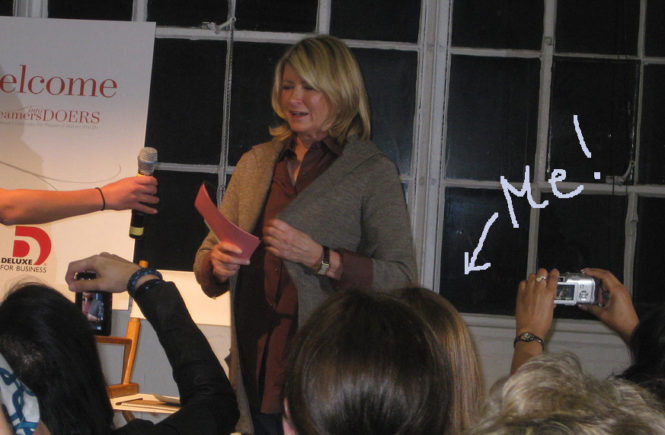So, here’s the thing about this little company I’m starting. I’ve, uh, never started a company before. (Throat clearing sound.)

And certainly not a food company. (A hard cough.)
And, I need to cultivate business wisdom and experience as fast as possible, because in less than two weeks, I will be my own boss. (Yeeeeeeeessss!)
Here’s the rub, though. It’s quite possible I will also be my own worst employee, as I don’t necessarily know much…just enough to know all the many things I don’t know. (Not hard to imagine a sustained coughing fit, only doused by the repeated sipping of a Mojito.)
So, let’s get to getting mentored! I’ve got the confidence (thanks, Mojito!) and the enthusiasm…probably time to ratchet up the skill, don’t you think?
Violet Beauregarde: [hugs Wonka] Mr. Wonka, I’m Violet Beauregarde.
Willy Wonka: [freaked out] Oh. I don’t care.
Violet Beauregarde: Well, you should care. Because I’m the girl who’s gonna win the special prize at the end.
Willy Wonka: Well, you do seem confident and confidence is key.
Building a Network of Advisors
My simple idea, though it requires a lot of leg work and self-confidence, is already yielding results. A cold-as-zilker-mint-chip (but warm in tone…as I do adore her brand!) e-mail to the truly wonderful Amy Simmons of Amy’s Ice Creams has already turned into a one-hour advice session with the maven herself. I learned so much and, perhaps most importantly, I am feeling good about what I’ve learned–and who I’ve learned it from.
I asked her permission to share some of her thoughts here, and she was gracious enough to insist that I share whatever was of value with anyone who could use it, so in no particular order:
What I Learned from Amy of Amy’s Ice Creams
1) Defining exactly what it is you are selling is key. For Amy, it’s clear that she is not just selling super-premium ice cream. She is selling an experience, complete with fanatical customer service, unique and delightful products and a happy and fun atmosphere to enjoy those things in.
2) Especially in food (but increasingly in everything else, too), personal recommendations are absolutely critical. So, though the product needs to be excellent enough for someone to recommend, it’s also true that it’s important that the brand be actually part of the community. Amy’s does this through their many (but focused) charitable works and being sort of omnipresent at events all over Austin, and I think it’s a key differentiator for them. They are also very involved in the food community, which is also crucial.
3) Plan for the long term and realize what the long term really means. Amy has a stated goal that for her company, the long term is 100 years. Having such a clear goal directs her decision making towards outcomes that may build slower, but surely more enduring and legitimate, value for her customers, her company, and her investors.
4) Fanatical focus on customers is essential, and yet, often unique. This seems evident, and it should be. And yet…how many times have you done business with someone that obviously did not have this philosophy? And, more importantly, did you do business with them again? Not likely.
Two of Amy’s operating principles that I thought were pretty unique and applicable was how she handles customer complaints. First, all complaint or suggestion e-mails go directly to her. Second, she turns complaining customers into secret shoppers. She admits that often the customer is just so tickled at being put in this position that she ends up with rave reviews from them from that point out (vs. maybe the straight scoop she was actually looking for) but if the worst that happens is that a complaining customer becomes an advocate, that’s not really so bad, is it?
It’s telling that when I asked Amy about why she went the retail route (vs. selling through grocery chains, for example), she looked a bit perplexed. “I’ve just always loved customers…and the challenges of customers.” For her, it wasn’t even a consideration. Of course she would have a retail space…that’s how she’d get to know her customer needs best and fill them.
5) Slow down! Amy believes the food experience is all about slowing down and savoring what you are eating…that the experience is more than just the taste. I have to say, this is one thing that I think Americans could take huge lessons on from the French. As Voltaire said, “Nothing would be more tiresome than eating and drinking, if God had not made them a pleasure as well as a necessity.”
Now that I’ve tried finding mentors, I’m hooked! I spoke this week with serial entrepreneur Gary Hoover, and I’m already salivating over the other many opportunities for foodie enlightenment that Austin holds. I’ve also begun to zone in on a few other areas that advice from the wise would be invaluable. Keeping those things in mind, I present:
Local Food Luminaries I’d LOVE to Talk to (in No Particular Order):
- Clayton Christopher of Sweet Leaf
- Bert “Tito” Beveridge of Tito’s Vodka (I know, that name is a little too apt, right?)
- Roy Spence of Royito’s (and GSD&M fame)
- Mary Louise Butters of Mary Louise Butters Brownies
- Stacey Bridges of Austin Cake Balls
- Chuck Smith of Moonshine Patio Bar & Grill
- Cipi Ilai of Austinuts
- Tracy Claros of The Sticky Toffee Pudding Co.
- Someone at D.L. Jardine’s (will probably just drive out for their tour in a few weeks)
- Looking for ideas on someone who owns a large, high-end catering firm or bridal planning business
If you know any of these people, let me know! I am up for the challenge of a cold call (or e-mail) but would prefer to make my plea for help a bit less random. 🙂
Who is on your dream team of mentors?
Desperately seeking knowledge,
Freckles



